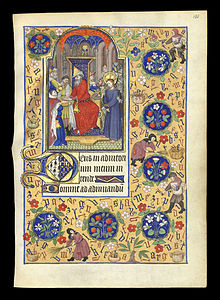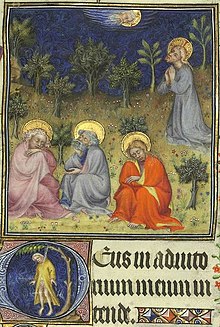
A prayer rope is a loop made up of complex woven knots formed in a cross pattern, usually out of wool or silk. The typical prayer rope has thirty-three knots, representing the thirty-three years of Christ's life. It is employed by monastics, and sometimes by others, to count the number of times one has prayed the Jesus Prayer.

Vespers is a liturgy of evening prayer, one of the canonical hours in Catholic, Eastern Orthodox, Oriental Orthodox, and Lutheran liturgies. The word for this prayer time comes from the Latin vesper, meaning "evening".

In the practice of Christianity, canonical hours mark the divisions of the day in terms of fixed times of prayer at regular intervals. A book of hours, chiefly a breviary, normally contains a version of, or selection from, such prayers.

Compline, also known as Complin, Night Prayer, or the Prayers at the End of the Day, is the final prayer liturgy of the day in the Christian tradition of canonical hours, which are prayed at fixed prayer times.
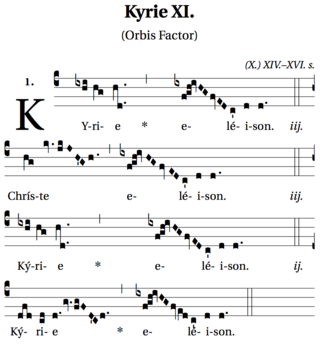
Kyrie, a transliteration of Greek Κύριε, vocative case of Κύριος (Kyrios), is a common name of an important prayer of Christian liturgy, also called the Kyrie eleison.

Matins is a canonical hour in Christian liturgy, originally sung during the darkness of early morning.

Lauds is a canonical hour of the Divine office. In the Roman Rite Liturgy of the Hours it is one of the major hours, usually held after Matins, in the early morning hours.

John Cassian, also known as John the Ascetic and John Cassian the Roman, was a Christian monk and theologian celebrated in both the Western and Eastern churches for his mystical writings. Cassian is noted for his role in bringing the ideas and practices of early Christian monasticism to the medieval West.
The Litany of the Saints is a formal prayer of the Roman Catholic Church as well as the Old Catholic Church, Anglo-Catholic communities, and Western Rite Orthodox communities. It is a prayer to the Triune God, which also includes invocations for the intercession of the Blessed Virgin Mary, the Angels and all the martyrs and saints upon whom Christianity was founded, and those recognised as saints through the subsequent history of the church. Following the invocation of the saints, the Litany concludes with a series of supplications to God to hear the prayers of the worshippers. It is most prominently sung during the Easter Vigil, All Saints' Day, and in the liturgy for conferring Holy Orders, the Consecration of a Virgin and reception of the perpetual vows of a religious or a diocesane hermit.

The Liturgy of the Hours, Divine Office, or Opus Dei are a set of Catholic prayers comprising the canonical hours, often also referred to as the breviary, of the Latin Church. The Liturgy of the Hours forms the official set of prayers "marking the hours of each day and sanctifying the day with prayer." The term "Liturgy of the Hours" has been retroactively applied to the practices of saying the canonical hours in both the Christian East and West–particularly within the Latin liturgical rites–prior to the Second Vatican Council, and is the official term for the canonical hours promulgated for usage by the Latin Church in 1971. Before 1971, the official form for the Latin Church was the Breviarium Romanum, first published in 1568 with major editions through 1962.
Nones, also known as None, the Ninth Hour, or the Midafternoon Prayer, is a fixed time of prayer of the Divine Office of almost all the traditional Christian liturgies. It consists mainly of psalms and is said around 3 pm, about the ninth hour after dawn.
Sext, or Sixth Hour, is a canonical hour of the Divine Office of almost all the traditional Christian liturgies. It consists mainly of psalms and is held around noon. Its name comes from Latin and refers to the sixth hour of the day after dawn. With Terce, None and Compline it belongs to the so-called "Little Hours".
The Benedictine Rite is the particular form of Mass and Liturgy celebrated by the Benedictine Order, as based on the writings of St. Benedict on the topic.

Vesting prayers are prayers which are spoken while a cleric puts on vestments as part of a liturgy, in both the Eastern and Western churches. They feature as part of the liturgy in question itself, and take place either before or after a liturgical procession or entrance to the sanctuary, as depends on the particular liturgical rite or use which is being observed.

The Ambrosian Rite is a Latin Catholic liturgical Western Rite used in the area of Milan. The Traditional Ambrosian Rite is the form of this rite as it was used before the changes that followed the Second Vatican Council.
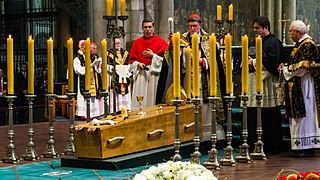
Absolution of the dead is a prayer for or a declaration of absolution of a dead person's sins that takes place at the person's religious funeral.
The Celtic mass is the liturgy of the Christian office of the Mass as it was celebrated within Celtic Rite of Celtic Christianity in the Early Middle Ages.
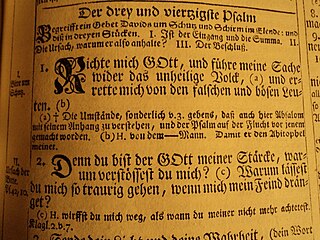
Psalm 43 is the 43rd psalm of the Book of Psalms, known in the English King James Version as "Judge me, O God, and plead my cause against an ungodly nation". In the slightly different numbering system used in the Greek Septuagint and Latin Vulgate translations of the Bible, this psalm is Psalm 42. In Latin, it is known as "Iudica me Deus". It is commonly attributed to the sons of Korah. In the Hebrew Bible, it comes within the second of the five books (divisions) of Psalms, also known as the "Elohistic Psalter" because the word YHWH is rarely used and God is generally referred to as "Elohim".
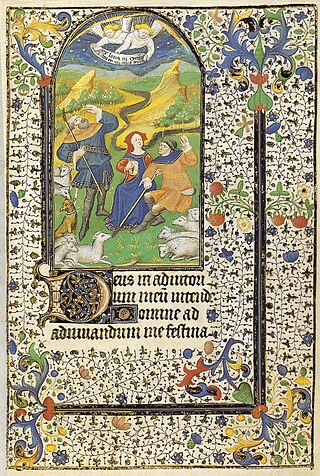
Psalm 70 is the 70th psalm of the Book of Psalms, beginning in English in the King James Version: "Make haste, O God, to deliver me". The Book of Psalms is part of the third section of the Hebrew Bible, and a book of the Christian Old Testament. In the slightly different numbering system used in the Greek Septuagint and Latin Vulgate translations of the Bible, this psalm is Psalm 69. In Latin, it is known as "Deus, in adiutorium meum intende".
The Daily Office in Anglican churches focuses the traditional canonical hours on daily services of Morning Prayer and Evening Prayer, usually following the Book of Common Prayer. As in other Christian traditions, either clergy or laity can lead the daily office. Most Anglican clergy are required to pray Morning and Evening Prayer daily.
